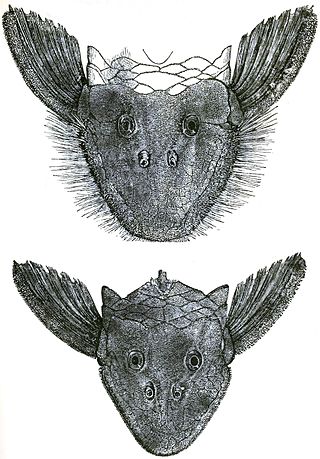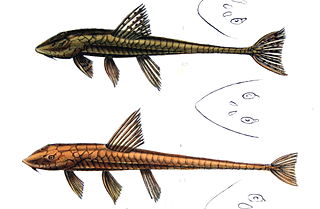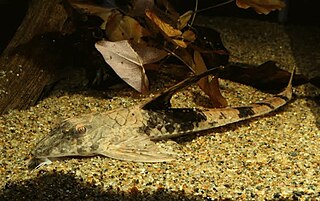
Ancistrus is a genus of nocturnal freshwater fish in the family Loricariidae of order Siluriformes, native to freshwater habitats in South America and Panama. Fish of this genus are common in the aquarium trade where they are known as bushynose or bristlenose catfish. In the aquarium hobby they are often referred to as bushynose or bristlenose plecos instead, but this may lead to confusion as "pleco" usually is used for Hypostomus plecostomus and its allies and is often used as a catchall term for any loricariids remotely resembling that species.

The Doradidae are a family of catfishes also known as thorny catfishes, raphael catfishes or talking catfishes. These fish are native to South America, primarily the Amazon basin and the Guianas.

Baryancistrus is a genus of freshwater Loricariid catfish. They inhabit flowing sections of rivers, especially clearwater, in the basins of the Amazon and Orinoco in Brazil and Venezuela. The largest species reach up to 34 cm (13 in) in total length.

Pseudancistrus is a genus of suckermouth armored catfishes native to South America.

Hemiancistrus is a genus of suckermouth armored catfishes. These species are native to South America. The taxonomy of this genus is complex and unclear, and major work has to be done. Many of these fish are popular aquarium fish.

Corymbophanes is a genus of armored catfish native to South America where they are only known from Guyana. Corymbophanes was originally placed in its own tribe Corymbophanini, but the first comprehensive molecular phylogenetic analysis of the subfamily Hypostominae found Corymbophanes to be nested within the tribe Ancistrini.

The striped Raphael catfish is a catfish of the family Doradidae. It may also be called Southern striped Raphael, talking catfish, chocolate doradid, chocolate catfish or thorny catfish. It is native to the Amazon, Paraguay–Paraná and lower Orinoco basins in South America. This peaceful, nocturnal species is a popular aquarium fish due to its pleasant temperament and curious nature. Despite its name "talking catfish", it does not speak.

Platydoras costatus, the Raphael catfish, is a species of thorny catfish native to rivers in Brazil, Suriname and French Guiana. It was long confused with other species in the genus Platydoras, especially the more widespread "true" striped Raphael catfish. P. costatus grows to a length of 24 cm (9.4 in) SL, and unlike P. armatulus the light stripe along the body of P. costatus does not extend onto the head. This fish is a minor component of local fisheries and is also found in the aquarium trade.

Platydoras is a small genus of thorny catfishes native to freshwater habitats in subtropical and tropical South America.

Doras is a genus of thorny catfishes native to tropical South America.
Rhinodoras is a genus of thorny catfishes native to South America.
Nemadoras is a genus of thorny catfishes native to tropical South America.

Leptodoras is a genus of thorny catfishes native to South America.
Hassar is a genus of thorny catfishes native to South America.

Loricariichthys is a genus of catfishes of the family Loricariidae.

Loricaria is a genus of armored catfish native to South America.

Bryconops is a genus of freshwater fish in the family Iguanodectidae from South America. It consists of small fish, all under half-a-foot long, with slender bodies and silvery scales, though there is some mild color variation. Several species can be identified by way of a humeral patch, and others have a reddish ocellus, or eyespot, on one or both lobes of the dorsal fin.
Rhinodoras gallagheri is a species of thorny catfish known from Apure River, Capanaparo River, and Arauca River, all left bank tributaries of the middle Orinoco, in the llanos regions of Apure and Barinas States of Venezuela. It is also known from the Aguas de Limon River in the Arauca Department of Colombia. This species grows to a length of 14.95 centimetres (5.89 in) SL.
Bryconops durbinae, sometimes listed under the name Bryconops durbini, is a small species of freshwater fish in the family Iguanodectidae. It is the smallest species of the genus Bryconops, and is endemic to the Tapajós river basin in Brazil.

Bryconops gracilis is a small species of freshwater fish from the rivers of South America. It is one of multiple species for which the common name "lambari" is used. Though not well-studied, it has been re-described in recent years in order to differentiate it from Bryconops alburnoides, a congener to which it bears a strong resemblance.















